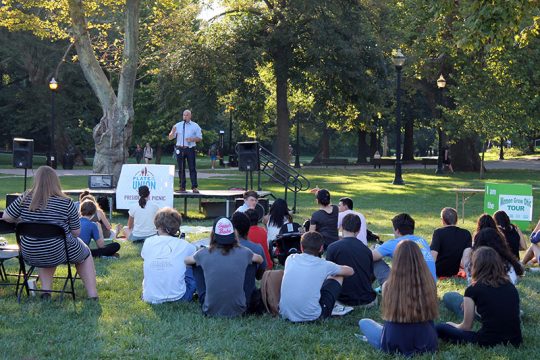With the presidential election only a couple months away, an Ohio State student organization hopes to bring food issues to the political table.
On Tuesday, Real Food OSU teamed with national coalition Plate of the Union to host the Presidential Picnic featuring “Top Chef” judge Tom Colicchio. The South Oval event was awarded to Real Food OSU after winning Plate of the Union’s Campus Challenge this spring.
“The nature of the Campus Challenge grant was that we had to come up with ideas to get the candidates, specifically Hillary (Clinton) and Donald (Trump), to talk about these issues,” said Real Food OSU president Emily Evans, a fourth-year in environment, economics, development and sustainability who also spoke at the event.
Evans said Real Food OSU was awarded $5,000 to carry out the event. It included speakers, food from Hot Chicken Takeover and Lavash Cafe and live music by local DJ Blvck Ice.
In addition to speeches by Colicchio and Evans, Dara Cooper of HEAL Food Alliance, Annie Warmke of Women Grow Ohio, Glennon Sweeney of the Kirwan Institute for the Study of Race and Ethnicity, Nicholas Pasquarello of the Central Ohio Worker Center and Will Petrik of Yes We Can Columbus also spoke.
The speakers covered issues including producers’ rights, equality for women and people of color in the food industry and food insecurity.
In his speech, Colicchio said food issues relate to prominent topics such as health care, national security and environment. He pointed to the increased cost of health care due to food issues, military applicants unfit for duty due to health problems and greenhouse gases emitted in food production as evidence.
“It’s time that we actually rise up and start demanding that these changes be made,” he said.
Colicchio noted hunger as an important issue to address and said over 40 million Americans struggle with food insecurity.
Cooper also connected food with a the issue of police violence. She said both issues disproportionately affect people of color.
Cooper called for audience members to consider what companies they supported when buying food, and invest in those with ethical practices.
“We need to be thinking across food systems,” she said. “We need a radical transformation.”
The event focused on bringing food issues into the presidential campaigns, but also attempted to influence change at OSU and in the local community.
Evans’ speech described Real Food OSU’s unsuccessful efforts to get University President Michael Drake to sign the Real Food Campus Commitment. The commitment would have OSU spend 20 percent of its food purchases on “real food” by 2020. Evans said the commitment would go beyond OSU’s current local food goals as “real food” is locally sourced, community-based, ecologically sound and fair for workers.
“It’s all about getting this to be a national conversation that politicians are having, but at the same time it needs to be a conversation that we’re all having,” she said before the event.
Real Food OSU communications director Sally Doyle, a third-year in landscaping architecture, said the crowd was a roughly even mixture of students and community members.
Doyle said a person can easily get focused on the parts of the food process they personally witness, so bringing different groups together helps to create awareness of the varied issues faced throughout the process of food production.
“I hope it showed students that politics matter, and whether you like (a candidate) or not disengaging is going to do nothing,” she said.











